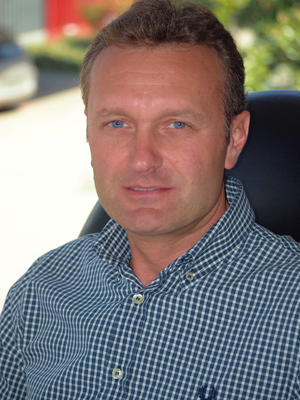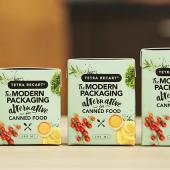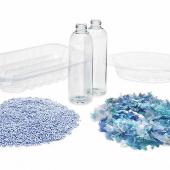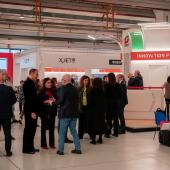Who’s next?
Acceleration by Stefano Lavorini
Question and answer session with… Gianmario Ronchi
How did you get on in 2011? Great. We returned to pre-crisis levels of turnover, even if with lesser though albeit satisfactory profit margins.
And the year at hand? 2012 got off to a slow start. The big concerns, one might say in all sectors, are finding it hard to invest and worry is widespread.
Your judgement of Ipack-Ima? A good fair. We presented the new Exacta in the sanitary version for food and pharma and we took the opportunity to organize a get-together of our salesforce abroad, but we also registered a series of new and interesting contacts.
The market has been seesawing for years now. What has changed in your company? We have done much to reorganize the production process and restructure costs.
Which means…? For example we incorporated Ronchi Teck of Soncino… An extra company or bank account also constitute costs to be cut.
Have you intervened on your personnel? No, ones workforce is fundamental. We didn’t even do so in 2010 when, without any work, we produced machines despite the fact we had no orders. Last year we worked at full rate without doing overtime, thus keeping our costs stable.
Hence your costs are stable? Yes, apart from the ones we don’t have control over: financial expenses and energy.
How is production organized? We design all the electrical and mechanical parts ourselves; we carry out the programming of the electronics, assembly and trials. Machining, circuitry and control panels are done outside the company.
Who are your customers? Mainly multinationals, with which we have a global agreement for supplying our machines the world over.
What do the end users demand these days? Up to some years back the focus was on technology, or that is efficiency and accuracy, but also on the capacity to achieve ad hoc solutions. Today technological evolution is taken for granted and they try and optimize on costs.
What does this actually mean? With some groups we have been able to standardize the range of products (gauge and height are decisive).
Once we have defined the standard with the customer, we manage to reduce the costs of the machine, avoiding customization for the single production sites. Better modes of purchasing and production of machine lots have enabled us to reduce prices by over 30%.
How much does customization count? Engineering design accounts for a sizeable part of a machine’s costs. It takes just a few hours to put together a standard machine against the 400/500 hours required to develop a machine made to order. Assembly doesn’t affect costs that much, which is why we are not interested in delocalizing production.
Is one better off spreading oneself across several sectors or several markets? Working with multinationals we cannot really predict the run of things from year to year, this goes both for applicative sectors as well as geographical markets. However we are buoyed by one constant factor: the American market has never let off, never mind how unfavorable the exchange rates have been.
How and where do you reckon on growing? As regards our current technology we are aboveall setting our sights on the food sectors (sauces, liquid and creamy products, milk, food oils) and pharmaceuticals (washes, syrups). Geographically obviously we are paying a great attention to Asia: in 2009 we opened a branch in Thailand, in 2011 in India and will probably be opening an office in China by the end of the year.
How do you manage to be competitive? As well as technology, we have always given service pride of place. We tackle training directly in the factory, in occasion of the trials done in a special section. If our customer does not know our technology we organize true and proper training sessions, even involving outside suppliers.
Future projects? In 2011 we designed and built a completely new machines, currently undergoing trials, that we may offer the market this year. R&D is essential.
What do you want to do when you grow up? We have consolidated our management but at the same time we are preparing a second generational changeover, because we want to keep Ronchi a family business. My brother Cesare and I have chosen this path, even turning to an external consultant and we have set up precise rules of cohabitation between the member of the new generation (5 siblings, 2 of which already operative).
Is there a specific value in being a family company? Yes, and in particular this is appreciated by the multinationals, who seek suppliers capable of guaranteeing products and service in time.
Any regrets? Like my brother I too worked alongside my father in the company: firstly during our summer holidays and subsequently, in the last year of high school, I already worked during the day and attended lessons in the evening. As far as work is concerned I have no regrets. I am only sorry I didn’t continue studying when I had the chance.
Any secret dreams? I would be very glad to leave my children something that they can aspire to. In running the company Cesare and have made it grow a lot, but the two of us don’t feel we are capable of having it grow further. Hence new capabilities are needed.
 Gianmario Ronchi, born 1965, is CEO along with his brother Cesare of Mario Ronchi SpA. He deals with the administrative and management side, while his brother looks after the technical and commercial side of business. Founded in 1966 by their father Mario, in 2011 the company had a turnover of 37 million euros, numbering 149 employees. The USA is their prime market accounting for 12.5 billion dollars.
Gianmario Ronchi, born 1965, is CEO along with his brother Cesare of Mario Ronchi SpA. He deals with the administrative and management side, while his brother looks after the technical and commercial side of business. Founded in 1966 by their father Mario, in 2011 the company had a turnover of 37 million euros, numbering 149 employees. The USA is their prime market accounting for 12.5 billion dollars.
Specializations: complete lines for filling liquid and doughy food cosmetic and detergency products (bottle unscramblers/orientors, fillers, cappers).




















